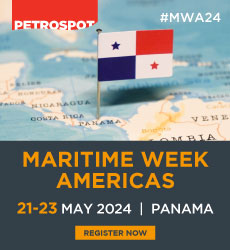Climate NGOs and civil society groups have told Bunkerspot that they are ‘deeply concerned’ by the Marine Environment Protection Committee’s (MEPC) ‘failure to firmly align global shipping with the Paris Agreement’s 1.5°C temperature-warming limit’.
As previously reported, ahead of this week’s meeting climate NGOs had been calling for GHG emissions reductions targets of 37% by 2030 and 96% by 2040, as well as zero emissions by 2050.
But the Revised Strategy which MEPC 80 has now formally adopted this morning instead has ‘indicative checkpoints’ of at least 20%, striving for 30%, emissions reduction by 2030; and at least 70%, striving for 80%, reduction by 2040. The strategy also aims to reach ‘net-zero’ (not actual zero) ‘by or around, i.e., close to 2050’, depending on ‘national circumstances’.
In a statement sent to Bunkerspot this morning, a coalition of climate NGOs and civil society groups acknowledged that this ‘brings shipping closer to the Paris Agreement’s temperature goal than before’, they added that it is still ‘far from sufficient to ensure shipping contributes its fair share to limiting the global temperature rise to 1.5°C, which would require emissions to halve by 2030 and reach zero by 2040, and will see shipping exceed its 1.5°C carbon budget between 2032 and 2033’.
The NGOS said that agreement is ‘the latest example of a pattern of behaviour at the IMO, where climate and environment issues are addressed but not adequately responded to, and raises further questions about the institution’s suitability as a venue for tackling shipping’s serious impact on the climate and oceans. With negotiations undertaken behind closed doors and without all stakeholders or the media having the possibility to be in the room, it also raises serious concerns about the IMO’s institutional transparency.’
Of course, the MEPC 80 was not all about the Revised GHG strategy. Member States also set a timeline for the adoption of mid-term measures, such as a global fuel standard and a greenhouse gas pricing mechanism, to be designed in the next two years and come into force in 2027.
In addition to the joint statement sent by the climate NGOs, Bunkerspot has also received an emailed message from Environmental Defense Fund, in which the EDF President Fred Krupp said: ‘Member States at the IMO showed they are willing to steer the shipping sector towards a clean future, but the 2023 Strategy is not in line with the 1.5 degree Celsius temperature goal of the Paris Agreement. The intermediate checkpoints are not strong enough to deliver the necessary emissions reductions and the language around the deadline for phasing out emissions is ambiguous.
‘The next two years will be crucial for the United Nations agency to develop robust mechanisms to eliminate emissions from ships in a manner that protects the environment and communities, and that delivers rapid and effective decarbonisation beyond the ambition agreed upon today. Member States must work together to get the sector closer to aligning with the Paris Agreement, and to set the standard for other hard-to-abate sectors to follow.’
Environmental Defense Fund’s Director, Global Shipping Marie Cabbia Hubatova added: ‘Maritime shipping is central to the global supply chain with 90% of the world’s freight carried by ships that run on fossil fuels. If ranked as a country, the shipping sector would be the world’s 6th largest emitter of greenhouse gas emissions. With the increasing demand to move goods, pollution from ships is expected to surge by nearly 50% in the next two decades and continue to rise, unless significant action is taken. Urgently phasing out emissions from shipping is critical to limit global warming in alignment with the 1.5 degrees Celsius temperature goal of the Paris Agreement.’
Opportunity Green also sent a statement to Bunkerspot this morning, in which the NGO’s Shipping Manager Ana Laranjeira, said: ‘This week had everything to be a historical moment. The last chance for the IMO to align with the Paris Agreement temperature goal of 1.5°C, vital to secure a just and equitable transition for the world's most vulnerable nations, and protect our global biodiversity, such as the world's coral reefs which will simply cease to exist in a world above this temperature threshold. This agreement does not get us nowhere near 1.5°C.
‘Nonetheless,’ Laranjeira continued, ‘we are grateful for the immensely hard work of the Pacific Island nations and other ambitious Member States to secure the best possible outcome in what were extremely intense rounds of negotiations. Every fraction of a degree is of crucial importance, and we need to continue to work to decarbonise international shipping in a just and equitable manner as soon as possible.’
Opportunity Green’s Founder and CEO Aoife O’Leary also sent us this comment, in her capacity as Director of the Skies and Seas Hydrogen-fuels Accelerator (SASHA) Coalition: ‘The IMO has agreed to strive for 10% of shipping’s energy sources to be zero emission by 2030, while at the same time stating that 2027 will be the earliest that any measures to achieve this will be put in place. That’s why it’s even more urgent now that the EU, the UK and other countries put in place decisive national or regional policy to ensure that truly sustainable alternative fuels are available for the shipping industry. The SASHA Coalition will continue to work with its members to ensure that even with this disappointing IMO outcome, the sector will still have access to the fuels it needs to decarbonise.’
The general statement sent by the climate NGOs to Bunkerspot gathered together some of the first impressions on MEPC 80 from across the environmental coalition, from which we offer this selection:
John Maggs, Clean Shipping Coalition: ‘There is no excuse for this wish and a prayer agreement. They knew what the science required, and that a 50% cut in emissions by 2030 was both possible and affordable. Instead the level of ambition agreed is far short of what is needed to be sure of keeping global heating below 1.5ºC and the language seemingly contrived to be vague and non-committal.’
Faig Abbasov, Transport & Environment: ‘Aside from FIFA, it’s hard to think of an international organisation more useless than the IMO. This week’s climate talks were reminiscent of rearranging the deckchairs on a sinking ship. The IMO had the opportunity to set an unambiguous and clear course towards the 1.5ºC temperature goal, but all it came up with is a wishy-washy compromise. Fortunately, states like the US, UK and the EU don’t have to wait for China, Brazil and Saudi Arabia to act. Ambitious national policies and green shipping lanes can have a global impact. It’s time to think globally, act locally.’
Lucy Gilliam, Seas At Risk: ‘There is a real sinking feeling in the IMO. This agreement does not address the climate crisis or meet 1.5 limits. In typical IMO fashion there was delay tactics in working groups while the real inaction happened behind closed doors where many were excluded until the final hour and in front of a near ultimatum. The Pacific’s brought it back from the brink. But let’s be clear that this was not transparent, just or equitable and it is reflected in the result reached.’
Delaine McCullough, Ocean Conservancy: ‘The climate emergency demands an international response, but the IMO’s struggle to set a GHG Strategy this week that adequately responds to the climate emergency raises questions of whether the organisation ultimately is up for the task. While the new GHG strategy nearly doubles the long-term ambition over the initial 2018 strategy, the checkpoints for 2030 and 2040 that were finally agreed to fall short of what is needed to ensure a warming limit of 1.5C. Thankfully, the Marshall Islands, Vanuatu and other small island states were able to secure stronger checkpoints, but the IMO must do better and others will need to step in.’
Madeline Rose, Pacific Environment: ‘Nations failed this week to put the global shipping industry on a credible 1.5C decarbonisation pathway. While the inclusion of 2030 and 2040 emissions reduction targets for shipping is not insignificant – and we commend the Republic of Marshall Islands and Vanuatu for their tireless diplomacy to hold them – this Strategy will see the shipping industry exhaust its 1.5C carbon budget by 2032. Fortunately, major maritime nations, ports, and companies can still act to fully decarbonize ocean shipping by 2040 – and that’s what we’ll be pushing them to do.’














